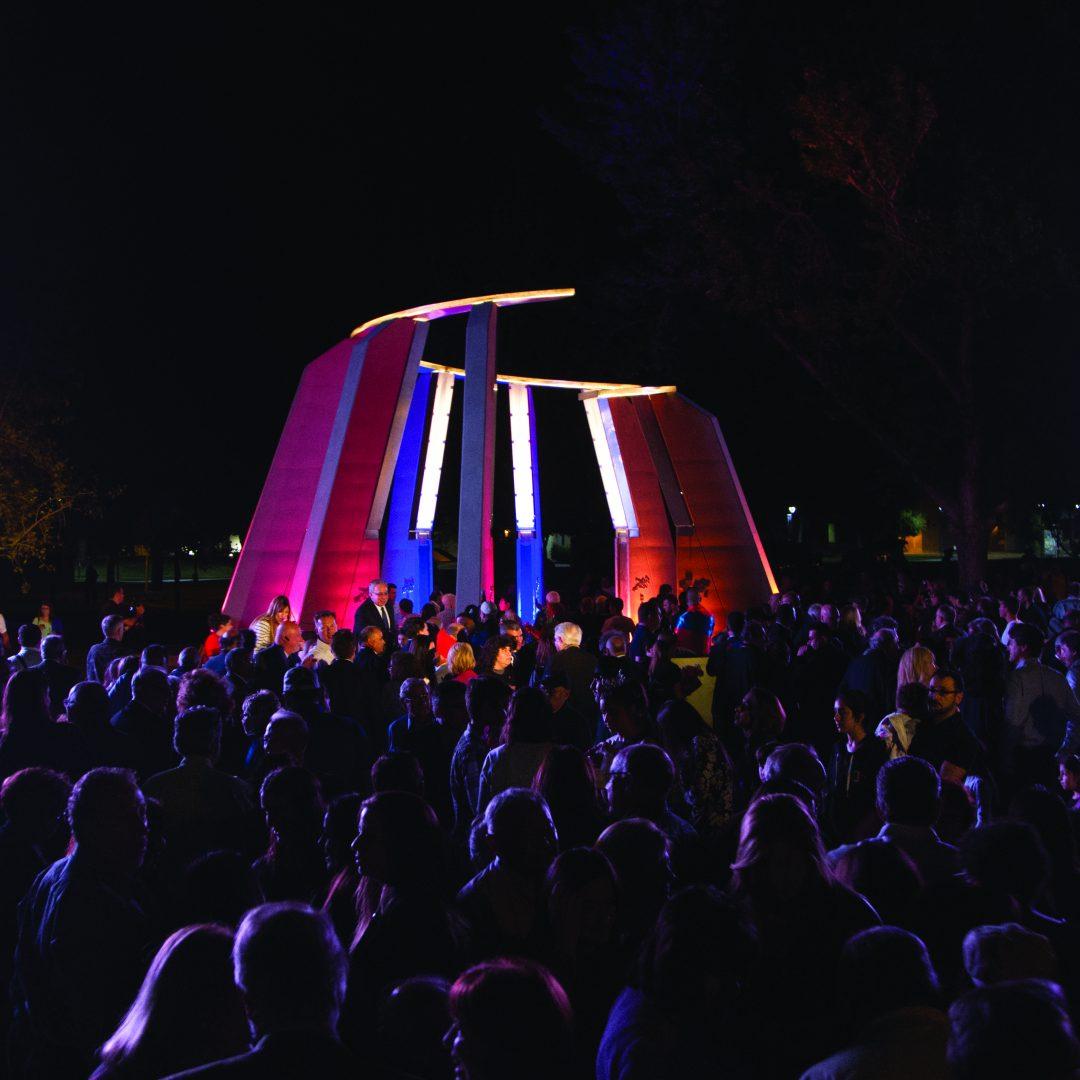By Megan Ginise & Tomas Kassahun
On the eve of the 100th anniversary of the Armenian Genocide, about 4,000 people gathered at Fresno State to unveil a monument which stands as a reminder of the mass killing of 1.5 million Armenians.
Located on the school’s Maple Mall, the monument is built with nine pillars to represent the victims who lost their lives at the hands of the Ottoman government in 1915.
Fresno State President Dr. Joseph Castro called the unveiling of the monument one of the most important events at Fresno State since the school’s founding in 1911.
“Tonight, we unveil our magnificent Armenian genocide monument, the first monument of its kind on a university campus in the entire United States,” Castro said. “The genocide was a defining moment for the lives of so many of you here today, and those throughout the nation and the world, and we know that it stands here tonight as an inspiration — a reminder of hope, of education, of memory and inspiration.”
Castro thanked the Fresno community, school administrators, monument donors and sponsors for their contributions, noting the ‘incredible teamwork’ it has taken for the monument to come to be properly recognized.
“We have 200,000 alumni,” Castro said, “160,000 right here in our Central Valley, and I know this monument is going to make a huge difference for each of us and all the generations to come. This monument will be a physical reminder each day for all of us that even when the devastating tragedy like the genocide occurs, hope and then joy can follow.”
Community leaders, students, faculty and the public gathered to witness and pay their respects to the monument, which Castro said stands as a symbol of commitment to human rights and justice throughout the world.
“This monument is also a reminder of the perseverance and hard work of the Armenian community,” Castro said. “It’s a reminder of the extraordinary contributions of so many of you here today.”
Rick Winer of Temple Beth Israel spoke of the healing process the Armenian community has come to face.
“We learned that we cannot let it happen to anyone in today’s world, and together we move forward to live life and create an optimism for the world around us in the face of what humanity has done,” Winer said. “We have so much work yet to do, but we continue to do it together.”
Winer said that the Armenian community is one of the many survivors of genocide who continue to promote global equality.
“One of the lessons we learned from living through such a difficult tragedy is that we can survive, and we can lift up,” Winer said. “We can take the scar that we bare and have it serve as an emblem that we are survivors in a difficult world, but a world that still blooms.
“Out of the ashes we create beautiful communities, beautiful culture and it’s an honor for our other religious communities to partner together with the leadership of the Armenian community to continue to have such a vibrant life locally.”
Consul General of the Republic of Armenia in Los Angeles, Sergey Sarkisov, reminded audiences of the importance of the monument today more than ever.
“Even a century later, the Armenian Genocide remains not properly recognized. We Armenians are ready and still stand ready to combat genocide, intolerance, indifference and any violence against any nation, race or ethnic group in any corner of the world.”
Many of the survivors of the 1915 genocide immigrated to the U.S. by establishing large Armenian vibrant communities, Sarkisov said, including those in Fresno.
Today Sarkisov is proud to contribute to the Armenian-American community — an economic, political and cultural life in the U.S. that is vibrant in Fresno.
“We honor our lost, and at the same time admire the positive legacy of their descendants in Fresno, that today is home to a vibrant and exemplary Armenian community throughout the world,” Sarkisov said.
“Turkish leadership today still refuses to recognize the Armenian genocide,” Sarkisov said.
“Moreover, it makes attempts to rewrite history, and we know that this kind of denial, the denial of the genocide, is considered to be the repetition of the genocide. This is an assault, not only on Armenians, but an assault on history, an assault on truth. It’s an assault on justice, and it is an assault on humanity itself.”




